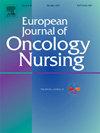Nurses’ experiences of palliative end-of-life care in patients at risk of a carotid blowout syndrome: A qualitative exploration
IF 2.7
3区 医学
Q1 NURSING
引用次数: 0
Abstract
Purpose
Hospital nurses play an important role in providing palliative end-of-life care, for example for patients with carotid blowout. In such cases, dying is a severe event in which exsanguination occurs. Little is known about nurses’ experiences regarding care to patients at risk of a carotid blowout. This study aims to explore thoughts, experiences, and opinions of nurses about what they consider to be quality end-of-life nursing care for patients and their relatives, specifically those at risk of carotid blowout syndrome and the impact of providing such care on their professional and emotional well-being.
Methods
This study employed a qualitative design using audio-recorded, semi-structured focus group interviews. Three focus groups were conducted, comprising 11 nurses who worked on a head and neck unit. Interview transcripts were analyzed using thematic analysis.
Results
Participants reported nursing priorities in end-of-life carotid blowout care, comprising patients’ wishes, emotional support, preparing patients and dying care. Participants mentioned that a carotid blowout event was rare and impactful. A comprehensive protocol and scenario-based training facilitated the provision of end-of-life care. This study identified areas for improvement, such as the opportunity for moral support and debriefing after a blowout event for involved nurses.
Conclusion
Remarkable knowledge emerged about nurses’ experiences regarding end-of-life care and frequently used nursing interventions. Being prepared and having a workable protocol to deliver end-of-life care emerge as key. This exploratory study facilitates discussion of areas important to nurses providing end-of-life care in rare and impactful conditions.
护士对有颈动脉爆裂综合征风险的患者进行临终姑息护理的经验:定性探索
目的医院护士在提供临终姑息护理方面发挥着重要作用,例如为颈动脉爆裂患者提供临终姑息护理。在这种情况下,死亡是一个严重的事件,其中会发生失血。护士对有颈动脉爆裂风险的病人的护理经验知之甚少。本研究旨在探讨护士的想法、经验和观点,了解他们认为对患者及其亲属(尤其是有颈动脉爆裂综合征风险的患者及其亲属)提供优质临终护理的意义,以及提供此类护理对其职业和情感健康的影响。共进行了三次焦点小组访谈,包括 11 名在头颈部科室工作的护士。访谈记录采用主题分析法进行分析。结果参与者报告了临终颈动脉吹脱护理中的护理重点,包括患者意愿、情感支持、患者准备和临终关怀。参与者提到,颈动脉爆裂事件非常罕见且影响巨大。全面的方案和基于情景的培训有助于提供临终护理。本研究发现了需要改进的地方,例如在发生颈动脉爆裂事件后为参与其中的护士提供精神支持和汇报的机会。做好准备和制定可行的方案是提供临终关怀的关键。这项探索性研究有助于对护士在罕见和有影响的情况下提供临终关怀的重要领域进行讨论。
本文章由计算机程序翻译,如有差异,请以英文原文为准。
求助全文
约1分钟内获得全文
求助全文
来源期刊
CiteScore
4.40
自引率
3.60%
发文量
109
审稿时长
57 days
期刊介绍:
The European Journal of Oncology Nursing is an international journal which publishes research of direct relevance to patient care, nurse education, management and policy development. EJON is proud to be the official journal of the European Oncology Nursing Society.
The journal publishes the following types of papers:
• Original research articles
• Review articles

 求助内容:
求助内容: 应助结果提醒方式:
应助结果提醒方式:


